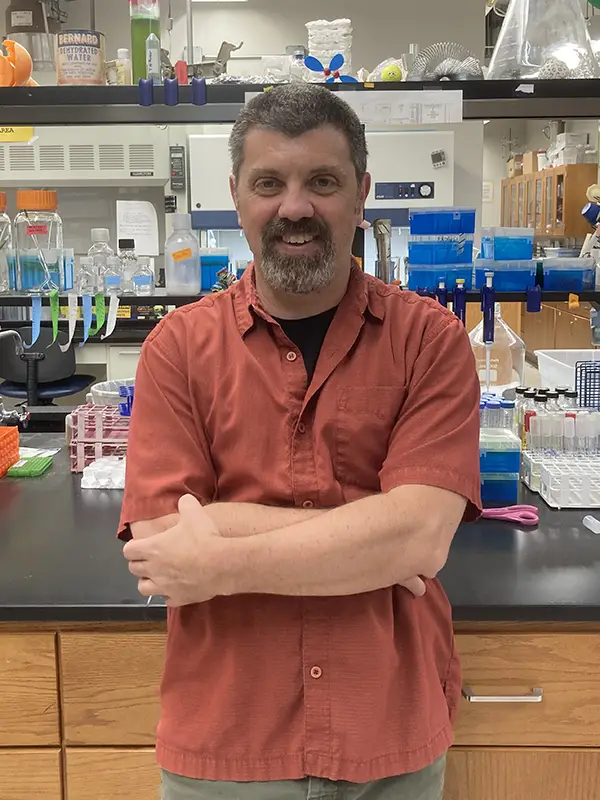Evolving Science

by Hanna Boshnag
The textbook many undergraduates in the field read, Microbiology: An Evolving Science, was co-authored by the department’s very own Erik Zinser. He joined the University of Tennessee in 2005, and after almost 20 years on the faculty notes the broad changes in how research is done and its implications for the field of microbiology.
Much of the work done in microbiology today seems to be entwined with bioinformatic and high throughput analyses, though it hasn’t always been that way. The tools in the researchers’ arsenal are more efficient and can collect more information. Zinser remarks, however, that it can be overwhelming trying to draw the biologically meaningful from this mass of information, and difficult to figure out what to do next.
“The challenge for students today is to figure out how to best deal with these tools. It’s a matter of: Are you letting the questions drive your research and not the technology?”
The research in Zinser’s lab is driven by questions about the marine photosynthetic bacterium Prochlorococcus, which plays a key role in global carbon cycling. Why is it so abundant? Why is it so productive in the ocean? And how is it able to survive out there? These are the questions the lab seeks to answer, because Prochlorococcus is the primary agent of carbon sequestration and producing organics in otherwise nutrient-poor areas of the ocean.
One of the primary obstacles to studying it in the lab is the difficulty in recreating its growth conditions, because Prochlorococcus isn’t on its own in the ocean. “It has other microbes surrounding it that basically chew up the peroxide and anything else, keeping those reactive oxygen species really low. So, the jump from its natural environment in the Pacific Ocean to the lab doesn’t translate very well.”
To compensate for this, the lab will either chemically treat the media to eliminate peroxide or grow Prochlorococcus alongside “helper microbes” that will remove the toxic peroxide for it.
In his time at UT, Zinser has served as a mentor and advisor for many undergraduate and graduate students passing through his lab. He explains that the initial transition to this came with the realization that microbiological bench-science training doesn’t always translate to being someone who guides others. He says, “One of the key things is realizing that all students have unique ways of learning and growing as scientists. My role is in how I can help them work at their weaknesses and take off with what they excel.”
What will make me a better researcher and scientist? At the core, this is a common question uniting microbiology students and researchers alike. Zinser emphasizes the importance of patience and commitment, because there’s a high rate of failure. However, if you’re willing to keep pushing until you come up with your discovery, you’re on your way to becoming a great scientist.